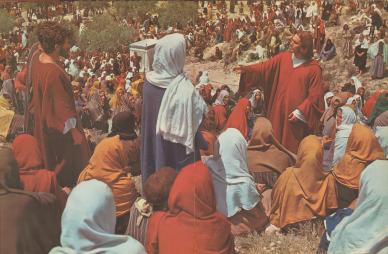 Jeffrey Wells has a brief piece on Nicholas Ray's King of Kings (1961) which is showing tonight at the American Cinematheque's Egyptian Theatre on Hollywood Boulevard. King of Kings has always been my guilty pleasure amongst my top ten Jesus Films. It's easy to make disparaging remarks about it, but even in spite of it's flaws I still love it. Wells gives five reasons why the film is well worth seeing and I have to agree with them all.
Jeffrey Wells has a brief piece on Nicholas Ray's King of Kings (1961) which is showing tonight at the American Cinematheque's Egyptian Theatre on Hollywood Boulevard. King of Kings has always been my guilty pleasure amongst my top ten Jesus Films. It's easy to make disparaging remarks about it, but even in spite of it's flaws I still love it. Wells gives five reasons why the film is well worth seeing and I have to agree with them all.(a) Miklos Rosza's score, particularly the overture;Point "e" is a little confusing, as Ray Bradbury (who will introduce the film tonight) actually wrote, rather than performed, the narration. That role was, of course, fulfilled by Jeffrey's namesake Orson Welles.
(b) Ron Randell's performance as Lucius, the thoughtful, morally conflicted Centurion;
(b) Jeffrey Hunter's lead performance during the last third;
(d) the shots that show perfect focus in both the foreground and background (which was pretty amazing during a time in which films would commonly rack focus to catch the foreground or background, but never both); and
(e) the eloquent narration by Ray Bradbury.
I have a number of posts on this film already, including a scene guide and a review and I also wrote and performed a podcast on King of Kings about this time last year.
Wells also has a follow up piece comparing the film with Ray's best known work Rebel Without a Cause, where he talks about one of my favourite aspects of the film - its use of colour. There's also this great comment towards the end.
"In defining the major Jesus films of the '60s-70s period, it's fair to say that Stevens' The Greatest Story Ever Told is the Protestant version, Zeffirelli's Jesus of Nazareth is the Catholic version, Pasolini's The Gospel According to St. Matthew is the Marxist version and King of Kings is the Zionist version."Thanks to Peter Chattaway for the tip offs.
No comments:
Post a Comment